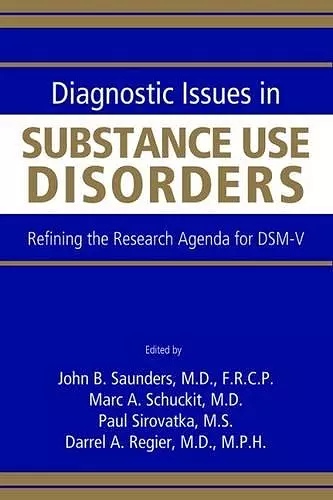Diagnostic Issues in Substance Use Disorders
Refining the Research Agenda for DSM-V
Marc A Schuckit editor Paul J Sirovatka editor Darrel A Regier editor John B Saunders editor
Format:Paperback
Publisher:American Psychiatric Association Publishing
Published:23rd Jun '07
Currently unavailable, and unfortunately no date known when it will be back

Inviting the help of colleagues worldwide, the concise Diagnostic Issues in Substance Use Disorders is part of the new series Advancing the Research Agenda for DSM-V. Its 19 chapters by an international group of experts are designed to stimulate questions that will help guide research related to the development of the next editions of the Diagnostic and Statistical Manual of Mental Disorders (DSM-V) and the International Classification of Diseases (ICD-11), with the goal of ensuring that the major substance use diagnoses represent the same condition in both references. They cover 10 major issues in three main sections:
• Overarching issues relevant for the development of international diagnostic systems—statistical modeling techniques and whether DSM-V should use categorical and/or dimensional diagnostic approaches; methods review, emphasizing new hybrid techniques for developing and testing diagnostic concepts; the need for separate clinical and research-oriented diagnostic criteria, incorporating both categorical and dimensional attributes; neurobiological changes characterizing substance dependence; the importance of cultural attributes in developing definitions of substance use disorders; and the history of the development of diagnostic systems and how to optimize the "crosswalk" between DSM and ICD.
• Research questions more specific to the substance use disorders section of DSM—comorbidity between substance use disorders and other psychiatric conditions, the relatively unique clinical course of substance-induced mental disorders and appropriate treatment approaches; the precision of the criteria and threshold for a diagnosis and how to improve them; the subtypes of substance use disorder, including how they have been derived and the extent to which they relate to neurobiological processes; the seemingly high prevalence of alcohol dependence in young people; suggested research questions to evaluate the application of diagnostic criteria to adolescents; and the specific psychoactive substances cannabis and nicotine.
• Whether substance use disorders should be included in a broader section termed "addictive disorders"—impulse-control disorders (especially pathological gambling and the advantages and disadvantages of adding it to the current substance use disorders section), identifying research opportunities regarding their assessment and neurocognitive and physiological bases, discussing the specifics of the research agenda and how it might be implemented, and presenting questions generated by the research agenda developmental process.
This informative compendium distills the findings of a wealth of recent research and concludes with recommendations for exploiting research opportunities...
This book documents the thoughtful approach of the substance use disorder working group in approaching the future DSM-V disorders. This well written and scholarly text will provide readers with useful insights into the DSM process for substance use disorders.
-- Michael Schrift, DO * Doody ReviISBN: 9780890422991
Dimensions: 229mm x 152mm x 19mm
Weight: 472g
352 pages